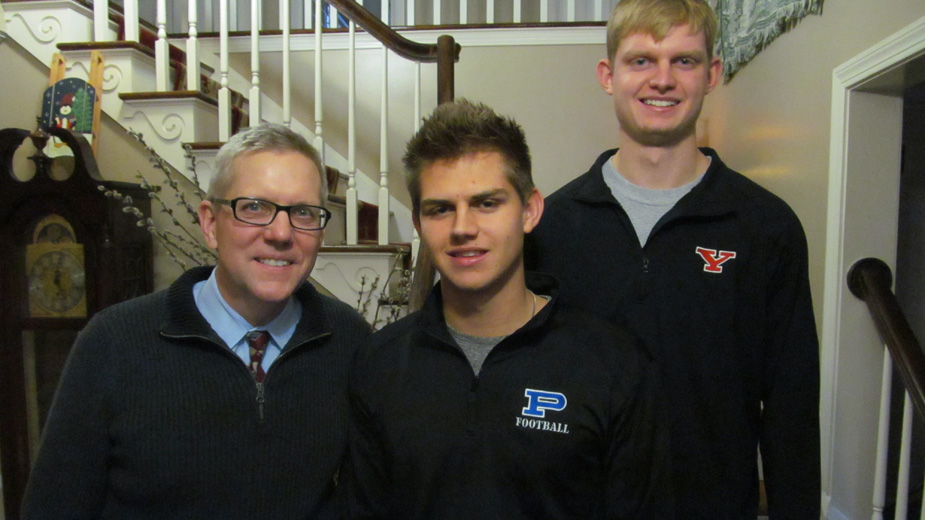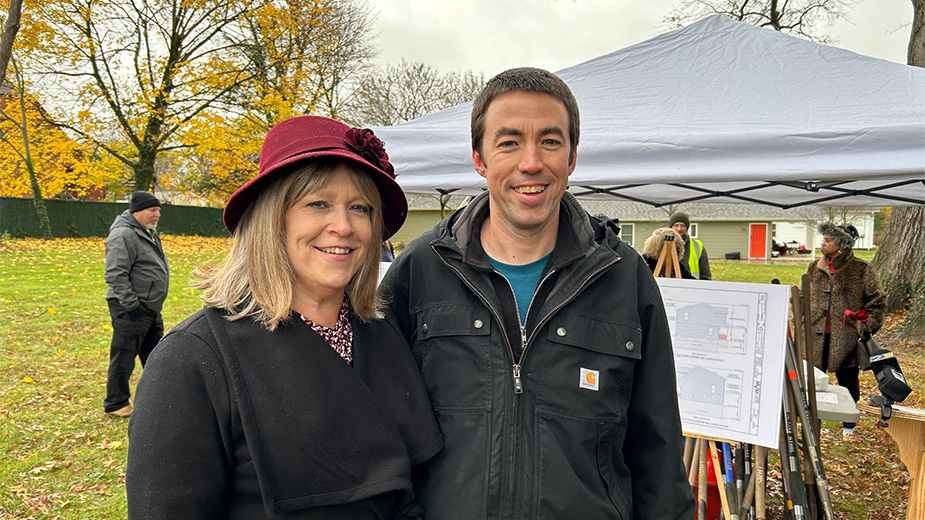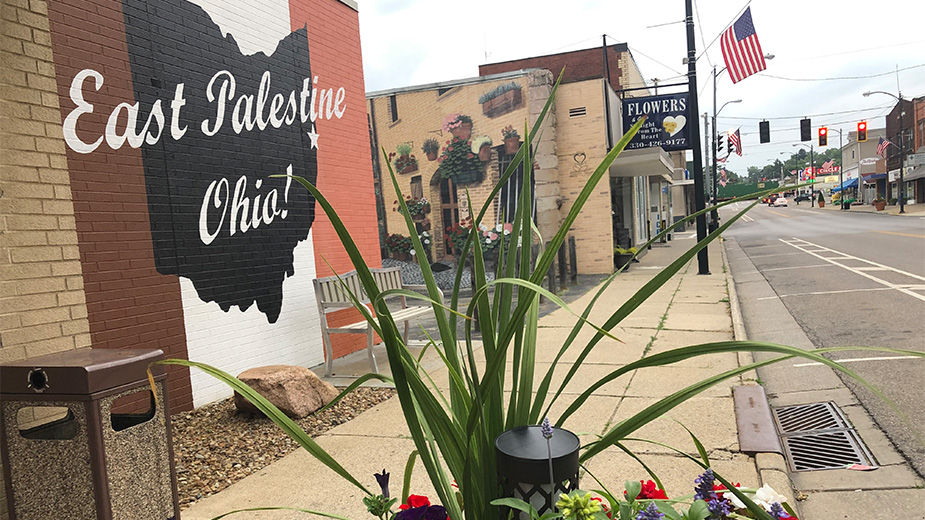Most Intriguing: Football Kicks Off McFadden’s Career
Editor’s Note: This is the first in a four-part series, “Most Intriguing People,” that will be posted this week. Be sure to watch the video component of our series on this week’s Daily BUZZ webcast.
YOUNGSTOWN, Ohio – After National Football League players retire, they cash in on their fame and gridiron heroics. Some hold pricey summer camps for boys eager to follow in their footsteps. Others go on the speakers’ circuit to deliver motivational talks.
Still others use the money they saved to buy a restaurant, a hunting camp, an auto dealership or beer distributorship that they rename for themselves.
Not Paul McFadden, president of the Youngstown State University Foundation. The history major at YSU kicked field goals and points after touchdowns as a Penguin from 1980 until 1983, then another six seasons in the National Football League.
Far more remarkable than McFadden’s kicking style – he sent balls through the uprights with his bare foot – is his path to becoming president of the YSU Foundation four years ago.
The foundation, which helps students pay for their education, was endowed with $13.5 million in 1966, a figure that has grown to more than $200 million in assets today.
McFadden has a low-key demeanor, even shyness, that masks a genuine humility and disciplined work ethic.
Another Penguin place kicker who enjoyed considerable success in the NFL, Jeff Wilkins, calls McFadden “just a man of high character. He’s a leader, not just in his job but about everything.”
Says the president of YSU, Jim Tressel, “Money’s not a big deal to him. He could have left here for a higher-paying job.”
Indeed, McFadden had to be coaxed to talk about himself and open up as much as he did.
McFadden wasn’t always so demanding of himself as he became as a football player.
While chosen the most valuable player on the Euclid High School soccer team – he was a midfielder – McFadden admits he was lackadaisical about his studies. Had the coach of the YSU soccer team, George Hunter, not recruited him, he likely would have enlisted in the Navy, McFadden says.
Instead he played soccer his freshman year at YSU. In the spring of 1980, the head coach of the football team, Bill Narduzzi, invited two members of the soccer team to try out for Penguins place kicker. “Go home and practice this summer,” McFadden remembers him saying.
So that summer McFadden spent an hour each morning at the Forest Park Junior High School football field. There, with the Columbia University Lions kicker, who had a full scholarship, he sent ball after ball through the uprights.
Then, on a morning in late August McFadden, the other member of the soccer team and four others, all wearing shorts and T-shirts, tried out before Narduzzi. Each kicked 50 balls toward the goal posts.
McFadden learned he had won the job only when he saw his name on the locker room door.
Making the Penguins football team changed his life. McFadden didn’t expect to win the job despite Hunter’s encouragement.
“I thought I’d be back on the soccer team,” he says. “My parents were not a fan of me switching to football” even though making the team came with a full scholarship.
Indeed, football was alien to McFadden.
“I didn’t know how to put on my gear or uniform,” he recalls. “Practice was hard.”
But he performed brilliantly, his foot resulting in 240 points, fifth-most in Penguins history (and third-most by a kicker), setting record after record. Most stood until Wilkins broke them.
One record that stood until the 1990s was making the longest field goal in YSU history, 54 yards, against Murray State.
His most memorable field goal was the game-winning 27-yarder his sophomore year at Middle Tennessee State University. With time nearly expired, the outcome of the game rested on McFadden’s leg. “Middle Tennessee tried to ice me,” McFadden recalls, that is, its coach called a time out to increase the pressure.
It proved to be one of only two times as a Penguin that he found himself in such a situation – he missed a 41-yarder that same year – but it gave him a taste of what he would face as a Philadelphia Eagle (the Eagles drafted him in the 12th round in 1984), then as a New York Giant and Atlanta Falcon.
In his first year in the NFL, he was the National Football Conference rookie of the year, scoring 116 points, all 29 PATs and 25 of 30 field goal attempts. That led to his selection as an All-Pro.
While in Philadelphia, he met another YSU Penguin, Ron Jaworski, who had started as quarterback for the Eagles in Super Bowl XV. In the twilight of his career, Jaworski was backup to Randall Cunningham and held the ball for McFadden’s kicks his first three years.
“He’d calm me down on the field,” the kicker says.
When McFadden left to play for the Giants in 1988, he led that team in points with 67: 25 of 27 PATs and 14 of 19 field goals. In his last year, 1989, with the Falcons, he scored 63 points, all 18 extra points and 15 of 20 attempted field goals.
An injury ended his professional football career. Of his six seasons in the NFL, McFadden found himself “under a lot more scrutiny, a lot more pressure” than his campaigns at YSU.
“You’re a nervous wreck, but you look so calm,” he says. “There’s not a lot of forgiveness” by either coaches or fans.
Football, McFadden learned, “teaches you life, the lessons of adversity and how to deal with it.”
A far more mature McFadden returned to YSU where, with Jim Tressel’s encouragement, he at last completed his senior year. “I thought I wanted to teach” McFadden says, and he did, one year at the Lyndhurst Middle School in South Euclid, outside Cleveland.
Toward the end of that school year, “Coach Tressel called and asked me to be a fundraiser” for the YSU athletics department. McFadden raised $4,000 for the Penguin Club. Thus began both his friendship with the man who today is president of YSU and his career as a fundraiser for the university.
“When he came back to YSU,” Tressel recalls, “he was totally grateful for all YSU had done for him and he wanted to give back.”
Says McFadden, “If it weren’t for YSU, I don’t know where I’d be. I was given my way to work through school. I was given the chance to show what I could do.”
During their first meeting, Tressel observed, “There was a tremendous humility about him … and he was very, very shy.”
To help him overcome that shyness, the YSU president remembers, “We thrust him into situations like the kicking camp.”
McFadden agrees: “That was his idea.”
The two star kickers at YSU continue to conduct the camps every June – Wilkins joined McFadden 20 years ago. “He doesn’t have to [do it],” Wilkins says. “He’s a very busy man.”
The fee charged each participant is modest, covering only the expenses of conducting the camp.
It was at the first camp in 1986 ago that McFadden met Wilkins, then a senior at Austintown Fitch High School. Wilkins joined McFadden as a co-host 20 years ago. Besides YSU, they conducted camps at The Ohio State University after Tressel became head coach of the Buckeye football team.
Two years after McFadden’s return to YSU, Tressel called him into his office in Stambaugh Stadium and told him, ”You need a master’s degree [in fundraising],” McFadden remembers.
Back then, only two colleges offered such graduate programs: the University of Indiana and St. Mary’s University of Minnesota. McFadden chose the latter because St. Mary’s focused on the practical aspects where Indiana took a more academic-research approach.
“He dove into it,” Tressel says.
“This was during the advent of distance learning,” McFadden says. He took his classes online and each summer spent the last two weeks of July and first of August on campus, writing his master’s thesis the third summer.
He paid all of his tuition, airline fares and three residencies from the $80,000 severance pay from the NFL.
His roles of increasing fundraising responsibility within the athletics department began in 1992 and he got to know C. Reid Schmutz, who became president of the YSU Foundation in 1989.
McFadden also worked closely with the first full-time professional fundraiser YSU hired in 1993, Vern Snyder, now chief fundraiser at the University of Toledo. He became a development officer for the university in 1998, a year before Snyder left to take a similar position at the Eastern Kentucky University.
“I had a great rapport with Reid,” McFadden says, and he learned a lot from Snyder. The three worked closely together just as McFadden worked closely with Tressel before he was named head coach of the Ohio State Buckeyes.
YSU President David Sweet and the board of trustees chose McFadden as director of all university development in 2002. McFadden consolidated all fundraising efforts under one umbrella.
The key to raising large sums for any worthy endeavor, for any worthwhile cause, McFadden says, is “developing relationships. Football opened the doors.”
Once invited inside, McFadden nurtured those relationships, impressing prospective donors – not all opened their wallets, purses or checkbooks – with his biography, sincerity and genuine interest in them as people and their desire to be remembered favorably.
As Tressel explains, “You create a network of people with the same interests. People here love him, his love for YSU. And there’s something about Paul that makes you want to help him.”
Rarely do benefactors commit during the first meeting, McFadden says. And he has a treasure trove of true stories about his patience and the patience of development officers at other universities staying in touch with benefactors.
There are no guarantees, McFadden says, and he and his colleagues at YSU and other schools are often surprised at the generosity and timing of gifts. “It’s only after they pass away that we learn what inspired them,” the foundation president says, whether to endow a chair or an academic or athletics scholarship, fund an academic discipline or laboratory.
“People who have the means want to use their good fortune to do great things,” Tressel knows. “People want to be helpful,” especially about encouraging other people to share their interests.
A potential benefactor who graduated from YSU makes it easier to share memories of good times, McFadden knows. As Tressel observes, “What Paul is so good at is telling the story of what YSU did for him. And can do for others.”
But McFadden has also kindled camaraderie with Valley residents who have come to appreciate the role the university plays in improving the quality of life.
“You never say, ‘Here’s what we need,” Tressel says. “You ask, ‘Can you help?’ “
Helen Stambaugh, class of 1944 and widow of Arnold Stambaugh (after whom Stambaugh Stadium is named) “was a special, special lady,” McFadden says with affection in his voice.
After spending Christmas mornings with his sons, he went to her apartment in Park Vista and spent Christmas afternoons with her until her death in February 2011.
So when in 2007, the Marching Pride needed new band uniforms to replace their worn-out uniforms, it was Stambaugh who contributed $150,000 to buy 200 new ones, which included new uniforms for the majorettes.
As Tressel says of McFadden, who saw something in the kicker that he didn’t see in himself, “Paul’s a worker and he loves YSU. He loves where he is and what he does and his belief in this institution.”
Pictured: Paul McFadden has two sons, Colton and Connor, who are following in their father’s footsteps on the gridiron.
MORE:
Watch Paul McFadden’s story in this video report
Copyright 2024 The Business Journal, Youngstown, Ohio.



